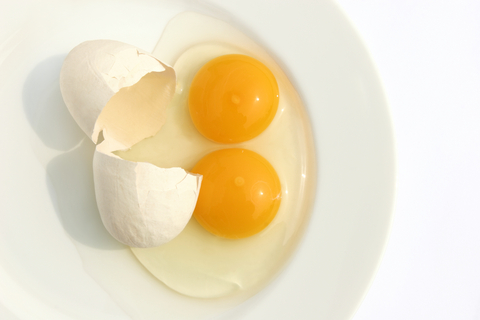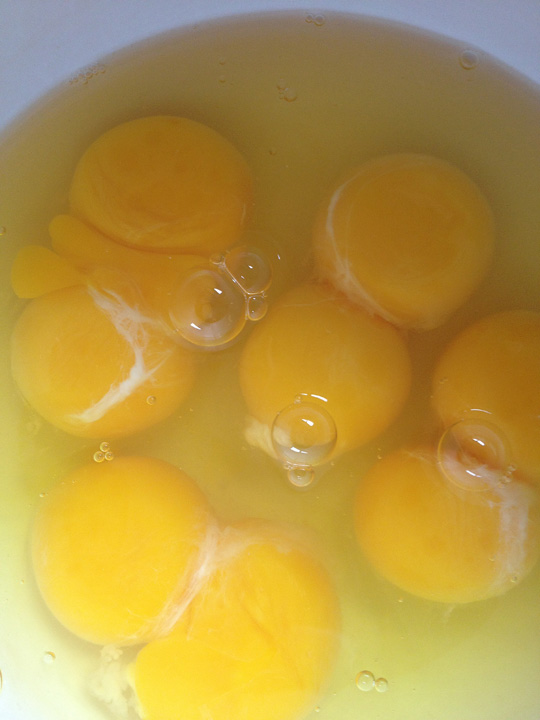It’s No Yoke!
May 02

Actually, it’s “yolk” — too many yolks. And it ain’t funny.
In the last carton of jumbo eggs I brought home from the supermarket, all 12 of them had double yokes. The whole dozen!
Does anyone remember when getting even one was a rarity? When we thought it was a sure sign of good luck?
If that’s true, a dozen lucky things will happen to me, although so far all I can think of is an unexpected $100 refund I got yesterday. And that could have been a coincidence.
Why So Many Double-Yolked Eggs?
What the hell are they feeding those chickens, I wondered. So I went to the modern equivalent of the Delphic Oracle and my not-so-new BFF, AKA Google, and here’s what I found:
“Double-yolk eggs occur when ovulation occurs too rapidly. . . the result of a young hen’s reproductive cycle not yet being synchronized.”
Unsynchronized ovulation? This cannot be a good thing. Can it? For the chickens. Or us . . .
Who’s Asking?
More important, who’s answering? Other sites in the vast and wondrous world of the web, like Yahoo Answers, say that finding double yolks is “an abnormality that rarely occurs.” Really? Then I just got a hell of a lot of abnormal in one little carton.
The whole event takes a sinister turn when you learn that some people view these freaky little ovoids not as a lucky sign, but an as omen of death. Yikes.
Other superstitions about finding a double yolk include: someone in the family is pregnant. Perhaps with twins. Double yikes.
The Poultry Pages (really) concurs that most double-yolkers are produced by young hens, and that as the chickens “become more mature, their systems settle down and this phenomenon becomes less frequent, or non existent.” Oh yeah? I know an omelet that says different.
Eggs-actly What Are The Chances Of A
Double Yolk?
The Daily Mail reports a woman in the UK discovered a box containing six double-yolked eggs, an incident that got the whole nation talking — or clucking, as the case may be.
The odds of such an event happening are one quintillion to one against. Here’s how you figure it: Only one in every 1,000 eggs is double-yolked, so the chances against getting six in a row are 1,000 to the power of six — or one quintillion. (A quintillion is a million million million.)
 Holy Hen House! That means that my find should be in the Guinness Book of Records. I got 12, not 6. And damn it, I only documented 7 of them — 4 for the omelet (shown here), and the last 3 that were left in the carton when I decided to write this post. The other five were hard-boiled, but, I assure you, very, very yolky.
Holy Hen House! That means that my find should be in the Guinness Book of Records. I got 12, not 6. And damn it, I only documented 7 of them — 4 for the omelet (shown here), and the last 3 that were left in the carton when I decided to write this post. The other five were hard-boiled, but, I assure you, very, very yolky.
On the other hand, another British paper covering the story concluded that double yolks may be more common than we think, so we shouldn’t whip ourselves into a frenzy as we whip up our omelets. Who knows.
Which Came First, The Chicken Or The Hormones?
If double yolks has something to do with ovulation, it probably involves hormones. We know that they feed hormones to make cows give more milk and steers grow faster, and we know that this is not a particularly good idea. So could hormones in our eggs be making those young chicks produce all these freaky eggs, and could this be anything but lucky for those of us who eat them?
I already buy grass-fed beef and organic milk whenever possible. Maybe I should start buying organic eggs. Ya think?
Although it’s also possible that organic eggs are not all they’re cracked up to be.
If I bought them, would I ever see a double-yolked egg again? And if I did, would it foretell death, pregnancy —or a winning lottery ticket? Hey, I just got a dozen eggs that beat the odds by more than a quintillion to one. 1000 to the 12th degree, to be exact, but you do the math. After that, winning the lottery should be easy. . . over easy.
See: Life By Lottery


